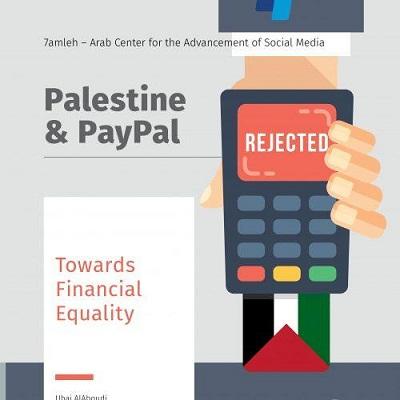2018-12-19
The report analyzes the abstention of the online payment company PayPal and the impact of this stance on the Palestinian economy and discusses readiness of the Palestinian economy and the efforts exerted by the Palestine Monetary Authority to overcome the economic obstacles as well as the developments that have taken place in recent years, presents the purchasing power of the Palestinian economy and the potential opportunities if PayPal provides its services to Palestinian citizens.

7amleh - The Arab Center for the Advancement of Social Media issued a new report on Wednesday December 12, 2018 titled "Palestine and PayPal - Towards Economic Equality" written by economic researcher Ubai Alaboudi. The report analyzes the abstention of the online payment company PayPal and the impact of this stance on the Palestinian economy. The report discusses readiness of the Palestinian economy and the efforts exerted by the Palestine Monetary Authority to overcome the economic obstacles as well as the developments that have taken place in recent years, presents the purchasing power of the Palestinian economy and the potential opportunities if PayPal provides its services to Palestinian citizens.
The report also discusses the advocacy efforts that have been put forward thus far and highlights the impact of the policies of online payment rails on digital rights. The report concludes with a series of recommendations for Palestinian stakeholders and decision makers. This report is necessary to demonstrate the importance of electronic commerce in general, and PayPal in particular, for Palestinians, given the circumstances of the long-term Israeli occupation. Indeed, Israel restricts import and export to the West Bank, restricts freedom of movement and the case is even more severe for the Gaza Strip.
In fact, both the West Bank and Gaza Strip suffer from economic stagnation, whilst the unemployment rate, if put together, reaches 25.9%. In this climate of restricted movement and trade, the ability to participate in the global information, communications and technology (ICT) sector may enable the growth of the Palestinian economy, improve the quality of life for Palestinians, and create new income and employment opportunities. However, the non-availability of PayPal in Palestine puts entrepreneurs, startups and freelancers in a vulnerable position. Although there are other options, PayPal remains the most widely trusted company. Therefore, many businessmen, entrepreneurs and freelancers are forced to move their businesses out of the country, thus not contributing to the Palestinian economy. They must bear an "additional" tax for doing business, including the additional costs of establishing an interest in a foreign country.
Based on the findings of this report, 7amleh Center calls on PayPal to reconsider its policies and provide Palestinians an equal access to the global markets. In addition, 7amleh recommends:
1-Conducting further research on the potential of economic development that can be generated by the company if to operate in Palestine, in addition to the remaining barriers to financial and technological readiness.
2-Establishing a coordination committee comprising of the Palestinian Authority, the Palestine Monetary Authority, representatives of the private sector and civil society organizations that can address any remaining "threats" or challenges that need to be resolved and to also develop a strong evidence-based appeal to PayPal that proves that Palestine is a safe environment financially.
3-Educating the public about discriminatory PayPal policies and mobilize them to support campaigns that focus on lobbying PayPal to change its policies on Palestine.
4-Lobbying PayPal to clarify its policy towards Palestine, in an evidence-based manner, whilst encouraging it to develop a clear plan to launch PayPal in Palestine.
5-Inviting representatives of PayPal to visit Palestine, in order to meet relevant stakeholders, in the spirit of "financial democracy" as stated by the CEO of the company several times.
This report is part of 7amleh - The Arab Center for the Advancement of Social Media ongoing campaign to defend Palestinian digital rights as human rights through research, reports, studies and awareness campaigns on the policies of social media networks and internet companies towards Palestinians. It is also worth noting that 7amleh has previously conducted studies and reports on the policies of Facebook, Google and other companies.
Stay up to date with our latest activities, news, and publications